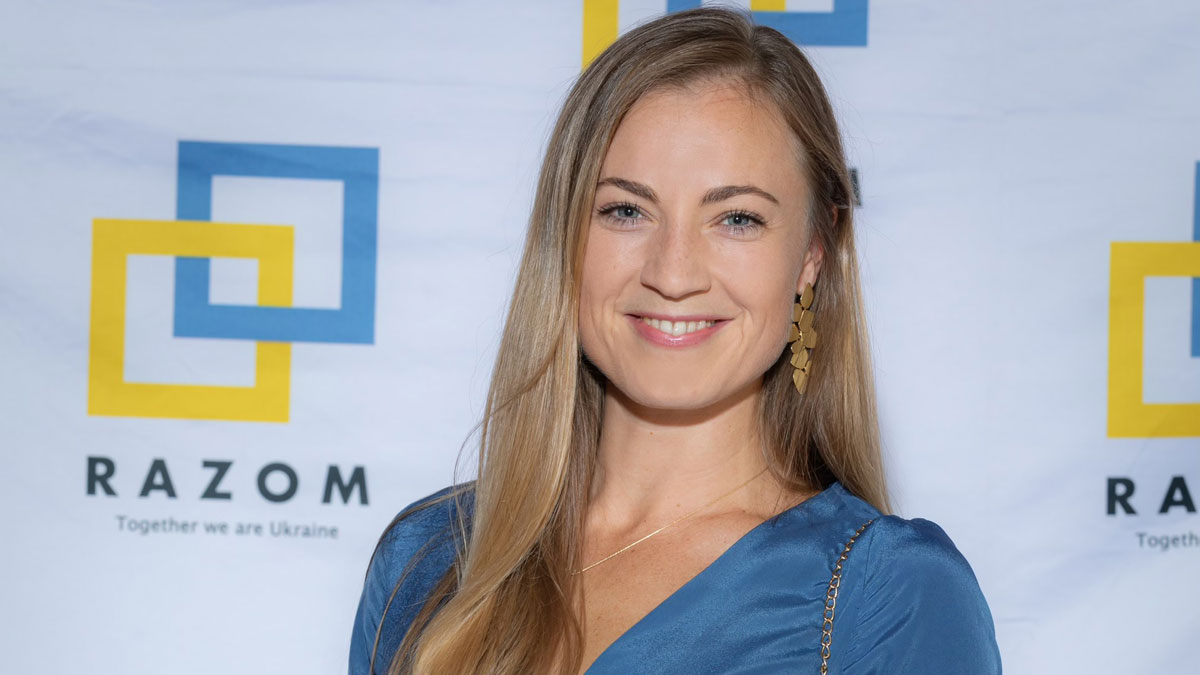Three weeks after getting back to New York from a trip back home to Ukraine in February 2022, Iryna Gudyma, KLN ‘17, began receiving phone calls from family, friends and former colleagues that the most recent Russian invasion of Ukraine had begun.
Gudyma had been a part of volunteer-led organization Razom for Ukraine prior to February 2022 and immediately began to take action to do whatever she could to help. Razom means “together” in Ukrainian, and the organization seeks to mobilize resources in the U.S. to support the people on the ground in Ukraine. Now, as the world acknowledges the one-year anniversary of the conflict, the work being done is more important than ever.
“Working for the development of Ukraine and my people is my passion, and has always been a priority for me,” Gudyma said. “It’s really unique, from this perspective, how this organization’s work and what people who are like-minded and following the same values and goals can mobilize a whole movement around supporting the efforts in Ukraine.”
In addition to her full-time job with UNICEF’s End Violence Against Children Partnership, Gudyma is working on the #RazomHealth Emergency Response Project to ensure that hospitals and patients in Ukraine have access to lifesaving medical supplies. Since February 2022 alone, the organization has raised $78 million, allocating $47 million of it to buy supplies to support infrastructure in Ukraine.
Razom Board Member and Treasurer Oksana Falenchuk noted that Gudyma was one of the first volunteers to start leveraging her own connections in Ukraine to create the international partnerships that make the aid Razom gives possible.
“She is a super optimistic person. She always has a smile on her face,” Falenchuk said. Even though she has encountered many challenging situations through her humanitarian work and faces stress from balancing these two parts of her life, she is still a leader in the organization.
In 2014, Gudyma helped establish and volunteered at the Ukraine Crisis Media Center during the Revolution of Dignity, when Ukrainians in Kyiv risked their lives to protest then-president Viktor Yanukovych’s decision not to integrate more closely with the European Union. The goal of the media center was to make sure international media had access to recent and accurate information on the ground. She often traveled to Eastern Ukraine, where the country was most effected, to see first-hand the state of crisis in the region.
In Eastern Ukraine, Gudyma interacted with people living in the war zone. At one point, Gudyma heard of two young boys who had lost their lives to an undetonated grenade they were playing with, which inspired her to start a communication campaign to inform children of the danger of unexploded ordinances. Through media and outreach efforts, she was able to distribute materials to educate residents on the best ways to keep themselves safe and protect their children.
“I think my experience is very much unique because what is happening now in Ukraine is what I saw at the very beginning and when it was starting,” Gudyma said.
Gudyma also worked as the media officer for the Organization for Security and Co-Operation in Europe during the first phase of the war. Gudyma observed how propaganda influenced the minds and behaviors of people and saw both positive and negative effects of media in conflicts. This motivated her to deepen her knowledge of communication in order to make a bigger difference, and ultimately led her to study communication for social change at Temple University on a Fulbright scholarship.
In her motivation letter for her Fulbright application, Gudyma detailed how she had seen communication work in war situations to influence the minds of people, and how she wanted to use this skillset for good instead of harm.
“She was a real contributor to the program. She brought experiences with her from her previous work,” said Tom Jacobson, chair of the communication for development and social change (CDSC) master’s degree program.
Jacobson noted Gudyma’s tremendous capacity for work and the impressive way she handled the application process to a competitive United Nations capstone program while finishing her CDSC work. She was also an advocate for the CDSC program, often speaking to prospective students and other people who were interested in what the program did.
“We are proud to have had her as a student in our program and wish her the best moving forward,” Jacobson said.
Gudyma continues to balance her work and volunteer endeavors with grace.
“We are so grateful for the world for continuing to support, but we need so much more,” Gudyma said. She is happy to continue her work with Razom if it means she can help alleviate some of the misery those in Ukraine, including her family, are facing because of the war.

